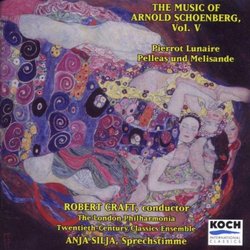| All Artists: Schoenberg, Lunaire, Pelleas & Melisande, Craft Title: Music of Arnold Schoenberg 5 Members Wishing: 0 Total Copies: 0 Label: Koch Int'l Classics Release Date: 4/25/2000 Genres: Pop, Classical Styles: Vocal Pop, Opera & Classical Vocal, Forms & Genres, Theatrical, Incidental & Program Music, Historical Periods, Modern, 20th, & 21st Century, Symphonies Number of Discs: 1 SwapaCD Credits: 1 UPC: 099923747123 |
Search - Schoenberg, Lunaire, Pelleas & Melisande :: Music of Arnold Schoenberg 5
 | Schoenberg, Lunaire, Pelleas & Melisande Music of Arnold Schoenberg 5 Genres: Pop, Classical
|
Larger Image |
CD Details |
CD ReviewsSchoenberg At His Peak 11/04/2000 (5 out of 5 stars) "Schoenberg's Pelleas is probably one of the most intense dramatic orchestral works I have ever heard. If you are looking for a lush sonorous work look no further. As for Pierrot, even though it has been labeled as rubbish it is one of those gripping pieces that may not catch the listener at first, but once it does it keeps one under it's spell permanently. I recommend this CD for everyone. Don't let the listener from Bombay put you off. Schoenberg's music is a brilliant. Buy the CD." Two important works by Schoenberg in very fine performances Craig Matteson | Ann Arbor, MI | 12/12/2005 (5 out of 5 stars) "It is unfortunate that this disk is out of print because the performance of each of the works is top notch. These works are prior to Schoenberg's development of his twelve-tone method. "Pierrot Lunaire" is an expressionist work with the usual intense poetry that wanders at the edge of madness and all other extremes. It was a fashion of the time and has its own beauty. If it doesn't speak immediately to you, a bit of reading in works like Glenn Watkin's terrific "Soundings" can help you get oriented. The work is called a sprechstimme rather than a traditional song cycle. This style grew out of the then fashionable reading of poetry against a musical background. For example, some poems might be read to Chopin. The performer of this work does not sing exactly, but does hit pitches. But does not exactly speak either. It is a rather interesting effect that adds to the characterization of Pierrot's madness.
Schoenberg selected twenty-one of fifty poems by the poet Albert Giraud (the pen name of Albert Kayenbergh) from the work of the same name. As the title would suggest the poems deal with the stock dell'Arte character known as Pulcinella, or Pierrot, or Harlequin, or a number of other names. He is always a trickster, and being mad is a perfectly fine job for him to have. He is always after Columbine as well, and never gets her. Here is drunk from the moonlight and the poems take him on a journey of wanting to give her a bouquet of blooms of moonlight to fantasizing about awful crimes and fearing execution by beheading from the scimitar shaped crescent moon. This is an important work of the early twentieth century and when performed well, as it is here, has a lot to offer a listener who is willing to open himself up to what the poet and composer (and performers) are offering. The work for large orchestra, "Pelleas und Melisande" is an amazing and hugely chromatic work. It is tonal, but a highly chromatic tonality that is akin to, but different from Richard Strauss and Gustav Mahler (who was far more traditionally tonal). It is a programmatic work in the sense that Schoenberg claims to have portrayed Maurice Maeterlinck's drama in music. Some have tried to unfold the whole drama, but it is clear that there are associations and transformations of some themes for various principal characters. You do not need to know the drama to enjoy the work, but it becomes something different when you do. Debussy wrote an opera fashioned from the same drama. Robert Craft, known for his work with Stravinsky, is a fine conductor and understands twentieth century music as well as anyone ever has. He is a fine musician, fine scholar, and we all owe him a great deal for bringing us so much beauty through music in a variety of ways. He does a great job of conducting these important works." |

 Track Listings (10) - Disc #1
Track Listings (10) - Disc #1